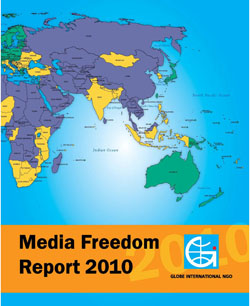 We are pleased to present our media freedom report, and we would like to express our thanks to the USA Embassy in Ulaanbaatar, the Open Society Forum (OSF) and the Mongolia Network Media Program of the Open Society Institute (OSI) for their support in preparing this report.
We are pleased to present our media freedom report, and we would like to express our thanks to the USA Embassy in Ulaanbaatar, the Open Society Forum (OSF) and the Mongolia Network Media Program of the Open Society Institute (OSI) for their support in preparing this report.
This report aims to highlight the current situation of how Mongolian journalists exercise their professional rights and what enabling environments exist for them to fulfill their duties to the public in a fair and responsible manner.
2010 was a year with significant legal media developments. All of the criteria, such as development of new technology, reform of traditional media, rapid progress in modern media and more media outlets (especially broadcasters), have determined the need and demand.
Globe International conducted a survey on March 2011 into a total of 418 extant laws and 1,287 laws on amendments between 1957 and 2010. In March 2011 there were 188 laws and law provisions relating to the media, information, transparency and secrecy. According to Legal Analysis jointly conducted by Globe International and London-based international NGO Article 19, in 2001 there were 91 such laws and law provisions.
The Freedom of Information bill, first included in the Parliamentary agenda in October 2005, is a special concern.
Six public institutions formed working groups to amend or draft 10 laws relating to media and information. The President’s Office and the Ministry of Justice and Home Affairs (MJHA) are working on amendments to the 1998 Media Freedom Law. The MJHA is drafting a Law on Media Outlets. New versions of the State Secrecy Law and the Law on Cyber Security are being drafted by the General Inteligence Authority. The Information, Communications Technology and Post Authority is due to start work on drafts for the Law on Information Security and the Broadcast Law.
The Communications Regulatory Commission has adopted the General Regulatory Conditions and Requirements for Digital Content Service, effective as from March 1, 2011.
In 2010, Mongolia remains a country with only partial media freedom, according to Freedom House. Reporters without Borders lists Mongolia as a country with “notable problems” in media freedom.
Globe International highlights the following issues in 2010 in the media freedom field:
- Serious case of confiscation of the host computer of the Niigmiin Toli daily newspaper
- Pressures exercised in the court, police and regulatory commission are likely to increase
- Editorial censorship and its scope are increasing
- The number of the criminal cases against journalists is growing
- The amounts demanded in compensation and awarded in civil and criminal defamation cases are increasing, which is becoming economic censorship
- Demands to reveal confidential sources by courts, police and public officials are not decreasing In 1999-2009, the courts heard 664 civil and criminal defamation cases, 37.7 per cent of them against media
GLOBE INTERNATIONAL NGO and journalists. In 2009, there were 17 civil cases against media and journalists. The largest amount demanded in compensation was 3 billion MNT, while the largest award was of 2,200,000 MNT. No criminal defamation cases were heard by the courts in 2009.
Concerning violations of journalist rights, Globe International has registered 30 cases relating to 18 journalists. Half of these cases involve threats and various other pressures from the police, courts and public institutions. Globe International claims that not all violations against journalists have been registered, and GI has been working with journalists who have approached us on unregistered cases.
This report comprises two chapters:
Chapter One comprises data and examples of violations of media and journalist rights, based on monitoring.
Chapter Two offers information on national legislation to guarantee or restrict freedom of expression.
Full Report available in PDF